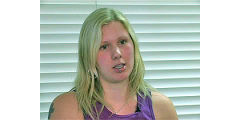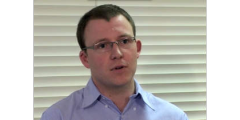Introducing podcasting and WebCT: implications for dyslexic students
June 26, 2007
Video >> Richard: “It’s the second year of Biogeography teaching that I’ve been doing now for 6 years, and the lectures, like most lectures, they change a bit. But the core of them stays much the same, and to be quite frank I was getting a little bit bored of saying the same sorts of …
Planning module content: mind-mapping, podcasting and WebCT (now Moodle)
Video >> Richard Field, Geography: “I actually planned it out, and I wanted to deliver it via what we call mind maps. Our first years have a series of lectures called study skills, or series of sessions called study skills given by a colleague of mine, and we talk quite a lot about teaching with …
Learning from lectures: a dyslexic student’s view
June 18, 2007
Video >> Kate: “Are there any teaching and learning strategies that some of your tutors may adopt that are particularly supportive of your study?” Annie Evans, student, Archaeology: “The thing I’ve found really useful is we have one lecturer who just puts everything on WebCT (now Moodle), like seminar reading lists…absolutely everything, journals…and then its …
Using a discussion board to support Maths students
Video >> Kate: “I understand that you’ve been using WebCT (now Moodle) a little bit last year and the feature you’re particularly wanting to use was the discussion boards. How’s that worked for you?” Joel Feinstein, Mathematical Sciences: “That’s right, yes. I wanted the students to be able to ask questions of each other, of …
Advising students on reading: prioritising reading lists
Video >> Kate: “What kind of help and support do you give for students in helping them focus and direct their readings, in your area?” Andrew Fisher, Philosophy: “Well, I think all lecturers do this; in the module guide I give quite a detailed reading list and that is split up by lecture, so in …
Podcasting Maths lectures: how and why?
Video >> Kate: “So I understand that you’ve been experimenting with the use of audio podcasting; tell me how that’s gone.” Joel Feinstein, Mathematical Sciences: “That’s right, yes. The University was kind enough to lend me a professional quality mp3 recorder which I’ve been using to make audio podcasts, audio recordings of all of my …
“Please turn on your mobile phones” – ubiquitous computing in the classroom
January 30, 2007
Mette Asmild, Andrew Jackson, Benson Lau and Nick Mount: “The adoption of the mobile telephone has revolutionised social and commercial communication in the 21st Century. Whilst it is estimated that the majority of students in British higher-education (HE) use mobile-‘phones and text/SMS-messaging, the learning benefits of adopting and supporting mobile ‘phone text-messaging communication from students …
Development and evaluation of a re-usable learning tool to supplement didactic lectures
January 29, 2007
Jo Leonardi-Bee: “The Division of Epidemiology and Public Health teaches Evidence Based Practice/Medicine (EBPM) to a variety of postgraduate courses. A common theme across these courses is to enable students to put theory from didactic lectures into practice using computer based statistical software packages. However, there are no practical sessions to accompany a particularly difficult …
Interprofessional teaching of communication skills
September 12, 2006
Simon Conroy, Lyneth Evans, Sujay Galen, Amy McPherson and Nick Raine-Fenning: Background “Communication skills are essential for all healthcare professionals when interacting with patients. Improving their communication skills can also lead to improved health outcomes for patients. Video feedback gives the student an opportunity for reflection, and is advocated by professional bodies in healthcare. “There …
“The bright young things and their parties” – eTeaching the Greek symposium as exploration of the digital classroom
January 17, 2006
Katharina Lorenz: “The use of information and communication technologies (ICT) has become a vital part of teaching and learning in Higher Education. But while the technology to design virtual learning becomes more sophisticated, teaching strategies which cater for the needs of the distant learner still await refinement. The digital classroom enhances the learning experience, facilitating …










